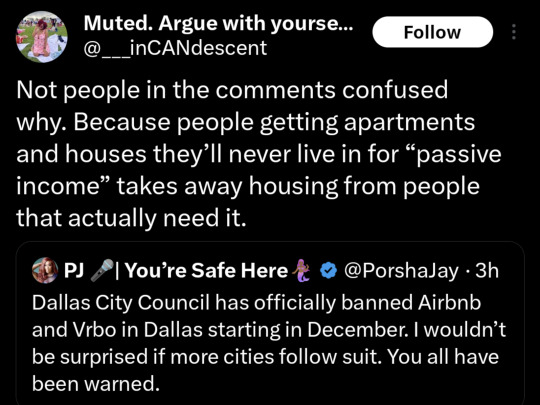#passive income
Text
so listen i fucking hate landlords but! i think we gotta stop making fun of landlords for "passive income" and stick to focusing on the way they, you know, get that income by exploiting people, by withholding the basic human right for shelter from others.
people love to be like oh landlords dont do any actual work like the rest of us, but like? a lot of disabled people cant do "actual work" either. people hate us because we collect ssi (if we can even get through those hoops) without working "real" jobs or creating any value that capitalism cares about. some of the stuff ppl say abt landlords sounds exactly the same. landlords DO suck but the way some of yall talk about them rlly shows that youre still stuck in a capitalist and christian and ableist mindset, where you think everyone should struggle to justify their existence, their right to food and shelter, their right to survive.
personally i think we should ALL get passive income (universal basic income <3) because we have inherent value regardless of how much we work. we just shouldnt impoverish our fellow people to do so!
2K notes
·
View notes
Text
This is your brain on fraud apologetics

In 1998, two Stanford students published a paper in Computer Networks entitled “The Anatomy of a Large-Scale Hypertextual Web Search Engine,” in which they wrote, “Advertising funded search engines will be inherently biased towards the advertisers and away from the needs of consumers.”
https://research.google/pubs/pub334/
If you’d like an essay-formatted version of this post to read or share, here’s a link to it on pluralistic.net, my surveillance-free, ad-free, tracker-free blog:
https://pluralistic.net/2023/02/24/passive-income/#swiss-cheese-security
The co-authors were Lawrence Page and Sergey Brin, and the “large-scale hypertextual web search-engine” they were describing was their new project, which they called “Google.” They were 100% correct — prescient, even!
On Wednesday night, a friend came over to watch some TV with us. We ordered out. We got scammed. We searched for a great local Thai place we like called Kiin and clicked a sponsored link for a Wix site called “Kiinthaila.com.” We should have clicked the third link down (kiinthaiburbank.com).
We got scammed. The Wix site was a lookalike for Kiin Thai, which marked up their prices by 15% and relayed the order to our local, mom-and-pop, one-branch restaurant. The restaurant knew it, too — they called us and told us they were canceling the order, and said we could still come get our food, but we’d have to call Amex to reverse the charge.
As it turned out, the scammers double-billed us for our order. I called Amex, who advised us to call back in a couple days when the charge posted to cancel it — in other words, they were treating it as a regular customer dispute, and not a systemic, widespread fraud (there’s no way this scammer is just doing this for one restaurant).
In the grand scheme of things, this is a minor hassle, but boy, it’s haunting to watch the quarter-century old prophecy of Brin and Page coming true. Search Google for carpenters, plumbers, gas-stations, locksmiths, concert tickets, entry visas, jobs at the US Post Office or (not making this up) tech support for Google products, and the top result will be a paid ad for a scam. Sometimes it’s several of the top ads.
This kind of “intermediation” business is actually revered in business-schools. As Douglas Rushkoff has written, the modern business wisdom reveres “going meta” — not doing anything useful, but rather, creating a chokepoint between people who do useful things and people who want to pay for those things, and squatting there, collecting rent:
https://rushkoff.medium.com/going-meta-d42c6a09225e
It’s the ultimate passive income/rise and grind side-hustle: It wouldn’t surprise me in the least to discover a whole festering nest of creeps on Tiktok talking about how they pay Mechanical Turks to produce these lookalike sites at scale.
This mindset is so pervasive that people running companies with billions in revenue and massive hoards of venture capital run exactly the same scam. During lockdown, companies like Doordash, Grubhub and Uber Eats stood up predatory lookalike websites for local restaurants, without their consent, and played monster-in-the-middle, tricking diners into ordering through them:
https://pluralistic.net/2020/09/19/we-are-beautiful/#man-in-the-middle
These delivery app companies were playing a classic enshittification game: first they directed surpluses to customers to lock them in (heavily discounting food), then they directed surplus to restaurants (preferential search results, free delivery, low commissions) — then, having locked in both consumers and producers, they harvested the surplus for themselves.
Today, delivery apps charge massive premiums to both eaters and restaurants, load up every order with junk fees, and clone the most successful restaurants out of ghost kitchens — shipping containers in parking lots crammed with low-waged workers cranking out orders for 15 different fake “virtual restaurants”:
https://pluralistic.net/2020/12/01/autophagic-buckeyes/#subsidized-autophagia
Delivery apps speedran the enshittification cycle, but Google took a slower path to get there. The company has locked in billions of users (e.g. by paying billions to be the default search on Safari and Firefox and using legal bullying to block third party Android device-makers from pre-installing browsers other than Chrome). For years, it’s been leveraging our lock-in to prey on small businesses, getting them to set up Google Business Profiles.
These profiles are supposed to help Google distinguish between real sellers and scammers. But Kiin Thai has a Google Business Profile, and searching for “kiin thai burbank” brings up a “Knowledge Panel” with the correct website address — on a page that is headed with a link to a scam website for the same business. Google, in other words, has everything it needs to flag lookalike sites and confirm them with their registered owners. It would cost Google money to do this — engineer-time to build and maintain the system, content moderator time to manually check flagged listings, and lost ad-revenue from scammers — but letting the scams flourish makes Google money, at the expense of Google users and Google business customers.
Now, Google has an answer for this: they tell merchants who are being impersonated by ad-buying scammers that all they need to do is outbid them for the top ad-spot. This is a common approach — Amazon has a $31b/year “ad business” that’s mostly its own platform sellers bidding against each other to show you fake results for your query. The first five screens of Amazon search results are 50% ads:
https://pluralistic.net/2022/11/28/enshittification/#relentless-payola
This is “going meta,” so naturally, Meta is doing it too: Facebook and Instagram have announced a $12/month “verification” badge that will let you report impersonation and tweak the algorithm to make it more likely that the posts you make are shown to the people who explicitly asked to see them:
https://www.vox.com/recode/2023/2/21/23609375/meta-verified-twitter-blue-checkmark-badge-instagram-facebook
The corollary of this, of course, is that if you don’t pay, they won’t police your impersonators, and they won’t show your posts to the people who asked to see them. This is pure enshittification — the surplus from users and business customers is harvested for the benefit of the platform owners:
https://pluralistic.net/2023/01/21/potemkin-ai/#hey-guys
The idea that merchants should master the platforms as a means of keeping us safe from their impersonators is a hollow joke. For one thing, the rules change all the time, as the platforms endlessly twiddle the knobs that determine what gets shown to whom:
https://doctorow.medium.com/twiddler-1b5c9690cce6
And they refuse to tell anyone what the rules are, because if they told you what the rules were, you’d be able to bypass them. Content moderation is the only infosec domain where “security through obscurity” doesn’t get laughed out of the room:
https://doctorow.medium.com/como-is-infosec-307f87004563
Worse: the one thing the platforms do hunt down and exterminate with extreme prejudice is anything that users or business-customers use to twiddle back — add-ons and plugins and jailbreaks that override their poor choices with better ones:
https://www.theverge.com/2022/9/29/23378541/the-og-app-instagram-clone-pulled-from-app-store
As I was submitting complaints about the fake Kiin scam-site (and Amex’s handling of my fraud call) to the FTC, the California Attorney General, the Consumer Finance Protection Bureau and Wix, I wrote a little Twitter thread about what a gross scam this is:
https://twitter.com/doctorow/status/1628948906657878016
The thread got more than two million reads and got picked up by Hacker News and other sites. While most of the responses evinced solidarity and frustration and recounted similar incidents in other domains, a significant plurality of the replies were scam apologetics — messages from people who wanted to explain why this wasn’t a problem after all.
The most common of these was victim-blaming: “you should have used an adblocker” or “never click the sponsored link.” Of course, I do use an ad-blocker — but this order was placed with a mobile browser, after an absentminded query into the Google search-box permanently placed on the home screen, which opens results in Chrome (where I don’t have an ad-blocker, so I can see material behind an ad-blocker-blocker), not Firefox (which does have an ad-blocker).
Now, I also have a PiHole on my home LAN, which blocks most ads even in a default browser — but earlier this day, I’d been on a public wifi network that was erroneously blocking a website (the always excellent superpunch.net) so I’d turned my wifi off, which meant the connection came over my phone’s 5G connection, bypassing the PiHole:
https://pluralistic.net/2022/04/28/shut-yer-pi-hole/
“Don’t click a sponsored link” — well, the irony here is that if you habitually use a browser with an ad-blocker, and you backstop it with a PiHole, you never see sponsored links, so it’s easy to miss the tiny “Sponsored” notification beside the search result. That goes double if you’re relaxing with a dinner guest on the sofa and ordering dinner while chatting.
There’s a name for this kind of security failure: the Swiss Cheese Model. We all have multiple defenses (in my case: foreknowledge of Google’s ad-scam problem, an ad-blocker in my browser, LAN-wide ad sinkholing). We also have multiple vulnerabilities (in my case: forgetting I was on 5G, being distracted by conversation, using a mobile device with a permanent insecure search bar on the homescreen, and being so accustomed to ad-blocked results that I got out of the habit of checking whether a result was an ad).
If you think you aren’t vulnerable to scams, you’re wrong — and your confidence in your invulnerability actually increases your risk. This isn’t the first time I’ve been scammed, and it won’t be the last — and every time, it’s been a Swiss Cheese failure, where all the holes in all my defenses lined up for a brief instant and left me vulnerable:
https://locusmag.com/2010/05/cory-doctorow-persistence-pays-parasites/
Other apologetics: “just call the restaurant rather than using its website.” Look, I know the people who say this don’t think I have a time-machine I can use to travel back to the 1980s and retrieve a Yellow Pages, but it’s hard not to snark at them, just the same. Scammers don’t just set up fake websites for your local businesses — they staff them with fake call-centers, too. The same search that takes you to a fake website will also take you to a fake phone number.
Finally, there’s “What do you expect Google to do? They can’t possibly detect this kind of scam.” But they can. Indeed, they are better situated to discover these scams than anyone else, because they have their business profiles, with verified contact information for the merchants being impersonated. When they get an ad that seems to be for the same business but to a different website, they could interrupt the ad process to confirm it with their verified contact info.
Instead, they choose to avoid the expense, and pocket the ad revenue. If a company promises to “to organize the world’s information and make it universally accessible and useful,” I think we have the right to demand these kinds of basic countermeasures:
https://www.google.com/search/howsearchworks/our-approach/
The same goes for Amex: when a merchant is scamming customers, they shouldn’t treat complaints as “chargebacks” — they should treat them as reports of a crime in progress. Amex has the bird’s eye view of their transaction flow and when a customer reports a scam, they can backtrack it to see if the same scammer is doing this with other merchants — but the credit card companies make money by not chasing down fraud:
https://www.buzzfeednews.com/article/rosalindadams/mastercard-visa-fraud
Wix also has platform-scale analytics that they could use to detect and interdict this kind of fraud — when a scammer creates a hundred lookalike websites for restaurants and uses Wix’s merchant services to process payments for them, that could trigger human review — but it didn’t.
Where do all of these apologetics come from? Why are people so eager to leap to the defense of scammers and their adtech and fintech enablers? Why is there such an impulse to victim-blame?
I think it’s fear: in their hearts, people — especially techies — know that they, too, are vulnerable to these ripoffs, but they don’t want to admit it. They want to convince themselves that the person who got scammed made an easily avoidable mistake, and that they themselves will never make a similar mistake.
This is doubly true for readerships on tech-heavy forums like Twitter or (especially) Hacker News. These readers know just how many vulnerabilities there are — how many holes are in their Swiss cheese — and they are also overexposed to rise-and-grind/passive income rhetoric.
This produces a powerful cognitive dissonance: “If all the ‘entrepreneurs’ I worship are just laying traps for the unwary, and if I am sometimes unwary, then I’m cheering on the authors of my future enduring misery.” The only way to resolve this dissonance — short of re-evaluating your view of platform capitalism or questioning your own immunity to scams — is to blame the victim.
The median Hacker News reader has to somehow resolve the tension between “just install an adblocker” and “Chrome’s extension sandbox is a dumpster fire and it’s basically impossible to know whether any add-on you install can steal every keystroke and all your other data”:
https://mattfrisbie.substack.com/p/spy-chrome-extension
In my Twitter thread, I called this “the worst of all possible timelines.” Everything we do is mediated by gigantic, surveillant monopolists that spy on us comprehensively from asshole to appetite — but none of them, not a 20th century payment giant nor a 21st century search giant — can bestir itself to use that data to keep us safe from scams.
Next Thu (Mar 2) I'll be in Brussels for Antitrust, Regulation and the Political Economy, along with a who's-who of European and US trustbusters. It's livestreamed, and both in-person and virtual attendance are free:
https://www.brusselsconference.com/registration
On Fri (Mar 3), I'll be in Graz for the Elevate Festival:
https://elevate.at/diskurs/programm/event/e23doctorow/
[Image ID: A modified version of Hieronymus Bosch's painting 'The Conjurer,' which depicts a scam artist playing a shell-game for a group of gawking rubes. The image has been modified so that the scam artist's table has a Google logo and the pea he is triumphantly holding aloft bears the 'Sponsored' wordmark that appears alongside Google search results.]
#pluralistic#victim blaming#fraud#going meta#douglas rushkoff#ad-tech#local search#wix#amex#thai food#business#rent-seeking#entrepreneurship#passive income#chokepoint capitalism#platform lawyers
2K notes
·
View notes
Text
Some of my favorite ways to make money online from the comfort of my bed:
Dropshipping
Affiliate Marketing
Blogging
KDP
Trading
YT Automation
Web design
Consulting
Meme/Niche social pages
POD
The landscape for making money (and with unlimited potential) has changed. Most of these you can start with little to no money. And there are hundreds more.
Give yourself the opportunity to learn new things.
Stop thinking it does not work.
Believe in yourself.
#making money#passive income#making money online#make money with affiliate marketing#make money from home#make money online
255 notes
·
View notes
Text
749 notes
·
View notes
Text









#prisoners#prisoners 2013#jake gyllenhaal#hugh jackman#paul dano#movie#movie icons#melissa leo#passive income#thriller movies#crime thriller#detective film#jake gyllenhaal movie#🔪#david dastmalchian
52 notes
·
View notes
Text
youtube
Shawn Fain, head of the UAW, led in 2023 what is arguably the most successful strike in the US this century.
He spoke at a Senate committee hearing about lazy freeloaders who live off the labor of others. Yes, he stuck it to Wall Street vampires and the mega rich who are usually big contributors to Republican candidates. When Republicans are in power, one of the first things they do is approve massive tax breaks for those massively wealthy contributors.
The GOP is big on reducing the rights of workers, eliminating Medicaid and Social Security, and opposing the minimum wage. Given clueless recent Republican comments on slavery, they are probably open to bringing back that institution in some form.
A reminder that last month the UAW endorsed President Joe Biden.
UAW's Shawn Fain says union will 'fight like hell' for President Joe Biden
#shawn fain#uaw#united auto workers#freeloading billionaires#the filthy rich#wall street freeloaders#passive income#wealth inequality#the income gap#election 2024#joe biden#vote blue no matter who
32 notes
·
View notes
Text

🔥 Revealed: The Secret Affiliate System That's Currently Making Vick Over $300,000* Per Month In Affiliate Commissions.
Wow! Over 12OO people attended our first syndicated live event! Don't miss out on this one! The vibe and live chat were electric! 💥
If there is no live event date in this post please save your spot below and you'll be able to watch the training immediately:
➡️ Save your free spot here
You will learn:
- The 7 biggest mistakes affiliate marketers make that ruin their business and make them go broke.
The #1 secret affiliate business model no one is talking about.
- The secret to earning multiple streams of commissions on autopilot.
- #1 Instant Traffic Secret: How to get massive amounts of high-quality traffic to your affiliate business for pennies on the dollar.
- How you will launch your own affiliate business in 7 days or less - guaranteed, even if you're starting from zero.
- For new and experienced affiliate marketers, or anyone looking to work online from home or anywhere else.
Don't miss out on this exclusive training done by a top marketer that has taught 400,000+ students since 2005.
➡️ Save your free spot here
Contact: [email protected]
*Disclosure: The results are not typical. These results are extraordinary achievements by Vick Strizheus and are NOT typical. Participants should not expect to achieve such significant income. These figures showcase what Vick Strizheus has accomplished using this affiliate system. It’s important to understand that some people may experience minimal or no results. All case studies, examples, and income figures presented are for illustrative purposes only and should not be interpreted as a promise or guarantee of earnings. This is not a “get rich quick” scheme. We encourage you to take your time, conduct your own research and consult with a professional advisor before making business decisions.
Disclaimer: Be advised that results shown are extraordinary and don’t serve as guarantees. Also, there are no guarantees concerning the level of success you may experience. There is no assurance that examples of past earnings can be duplicated in the future. As stipulated by law, we cannot and do not make any guarantees about your ability to achieve results with our ideas, programs, information, testimonials, tools, and strategies. We don’t know you personally, and your results in life are up to you. We are not responsible for your actions. Our goal is to help you by providing great content, direction, and strategies that we believe can move you forward. Transparency is important to us, and we hold ourselves to a high standard of integrity. We hope the programs and content we offer bring you a lot of value.
Please Note: Achieving success in any business requires hard work, dedication, and a willingness to continually learn and adapt. There are no shortcuts to lasting success. Your commitment and effort are essential components in your journey towards achieving your goals.
Read the full Disclaimer here.
#affiliate marketing#online business#make money online#make money with affiliate marketing#work from home#make money from home#entrepreneurship#how to make money#make money as an affiliate#affiliate marketers#affiliate marketer#affiliatemarketing#affiliate#affiliate program#affiliate links#work at home mom#workfromhome#earn passive income online#passive income#how to start a business#start a business#startbusiness#earning money online#make money on the internet#make money#earn money from home#how to earn money#smallbusinessowner#small business
42 notes
·
View notes
Text
How can I make $1,000 through affiliate marketing?
Hi,
Making $1,000 through affiliate marketing requires a strategic approach and consistent effort. Here's a step-by-step guide to help you achieve this goal:
Choose a Niche: Identify a niche that aligns with your interests and has a target audience. This helps you create content that resonates with your audience.
Research Affiliate Programs: Look for reputable affiliate programs within your chosen niche. Consider factors such as commission rates, product quality, and the program's reputation.
Build an Online Presence: Establish a platform where you can share content related to your niche. This could be a blog, YouTube channel, podcast, or social media profile.
Create High-Quality Content: Develop valuable, engaging content that provides solutions or information to your audience. Incorporate your affiliate links naturally within the content.
Use Multiple Marketing Channels: Diversify your reach by utilizing different marketing channels. If you're blogging, engage in social media promotion, email marketing, or even consider paid advertising to expand your audience.
Build Trust with Your Audience: Establish trust by being transparent about your affiliate partnerships. Only promote products or services you genuinely believe in and that provide value to your audience.
Optimize for SEO: Implement search engine optimization (SEO) strategies to improve the visibility of your content. Research and incorporate relevant keywords to attract organic traffic.
Create Compelling Calls-to-Action: Encourage your audience to take action by creating compelling calls-to-action. Clearly explain the benefits of the products or services you're promoting.
Track and Analyze Performance: Use tracking tools provided by affiliate programs to monitor the performance of your affiliate links. Analyze the data to understand which strategies are most effective.
Scale Your Efforts: As you start earning commissions, reinvest in your affiliate marketing venture. Consider scaling up your efforts by creating more content, exploring additional affiliate programs, or investing in advanced marketing strategies.
Stay Consistent: Consistency is key in affiliate marketing. Regularly update your content, engage with your audience, and adapt your strategies based on the performance data.
Explore Advanced Techniques: Once you have a solid foundation, explore advanced techniques such as funnel optimization, split testing, and advanced marketing strategies to further increase your earnings.
Remember that success in affiliate marketing takes time and persistence. Be patient, adapt to changes in the market, and continuously refine your approach based on the feedback and data you receive. With dedication and the right strategies, reaching $1,000 in affiliate marketing earnings is an achievable goal.
"Get Started with The Rapid Profit Machine Today, You'll Also Get FREE TRAFFIC" Link My Bio
Thanks,
Mahmudul Hasan
#make money online#earn money online#make money from home#make money tips#passive income#make money fast#affiliate marketing#online business#online income#makemoneyonline#work from home#side hustle#how to earn money
53 notes
·
View notes
Text
Hot take: Passive Income is just other people making you money.
14 notes
·
View notes
Text
When I was a teen we’d randomly Skype with people and do our mundane day to day or nightly things we need to do. I’d love to get those connections back again.
We’d sit and just talk whilst doing other things. Right now my side hustles are so isolating. I’d love to find someone else on the website building journey where we can chill together whilst doing our work.
If I’ve got anyone like this on my blog, definitely pop up because I could do with a pacing partner, accountability partner, or someone who just wants to sit in each others presence for company whilst we both do our work.
#need a penpal#penpals#pen pal#penpal#skype#skype session#skype me#side hustle#side hustle plan#passive income#lonely blogger
24 notes
·
View notes
Text

#Twitter#@___incandescent#Confused#Passive income#Need#@porshajay#Dallas city council#Airbnb#Vrbo#Dallas#December#Warned
47 notes
·
View notes
Text
youtube
12 notes
·
View notes
Text
Friends, what?? What’s society6 doing?

While I have loved this platform for a long time, it’s not really feasible for me to give them 60-155 a year for the opportunity to make $0.40 on a pair of socks once in a while. I appreciate they want to limit lower quality designs, but this makes it difficult to suggest society6 to other artists, let alone justify it for myself. For me the only incentive these paid plans have is, “we won’t delete your stuff”.
I’ve opened my s6 shop in 2018 and have had to send people to my page in order for things to be found. Im so sad today looking at the catalogue of content that I won’t be able to offer anymore because theyre going to delete it all unless I give them $13 a month. I’m debating still if it’s worth that much just to preserve the catalogue of work and progress over the years.
So ….
#society6#print on demand#design#pattern design#illustration#small business#tumblr polls#please#graphic design#art#pattern#nyc artist#nola art#nola artist#support content creators#small artist#small biz#big feels#freelance#passive income
16 notes
·
View notes
Note
Hello 👋 how are you? I love your page and you feel like a comfort person. Thank you. I wanted to ask if you have some ideas regarding jobs and finance for those who don't have full time jobs. Do you have any recommendations for jobs that you can do online and earn passively? Thank you ♥
Hi love! Thank you so much. Glad to hear you enjoy my page and its content <3
Some contract/freelance jobs I would recommend to increase your (potential) passive income include:
Sell items online like Poshmark/Depop, eBay, etc.
Purchase & flip domains
Purchase/resell clothing, accessories, and other trending items
Rent out items or owned spaces (in your home, parking spaces, classes you've purchased from a membership, etc.)
Create a social channel (YouTube/TikTok) or blog with ads
Write an e-book/a course/self-published book
Affiliate marketing
Sell photo presets/templates/photography/art online
Investing in a high-yield savings account (/CD) or dividend stocks
Hope this helps xx
#passiveincome#income streams#financial planning#money making#investment ideas#life advice#personal finance#passive income#online income#freelance jobs#resellercommunity#q/a
24 notes
·
View notes
Text
How to make money while traveling
Traveling the world can be an exciting adventure, but it can also be an expensive one. Fortunately, there are many ways to make money while traveling that can help fund your adventures and allow you to see more of the world without breaking the bank. In this article, we will explore some of the best ways to make money while traveling.
Freelancing
If you have a skill that you can offer online, freelancing is an excellent way to make money while traveling. Many companies and individuals are willing to pay for services such as writing, web design, social media management, and graphic design. You can find freelance work through various websites, such as Upwork, Fiverr, and Freelancer. Freelancing allows you to work from anywhere in the world, as long as you have a reliable internet connection.
Teaching English
Teaching English as a foreign language is another popular way to make money while traveling. Many countries, particularly in Asia, are always looking for native English speakers to teach English to their citizens. You can find teaching opportunities through various programs such as the Peace Corps, Teach for America, and private language schools. Teaching English can be a fulfilling experience, and it allows you to immerse yourself in a new culture while earning money.
Working in the Hospitality Industry
Working in the hospitality industry is another excellent way to make money while traveling. Hotels, hostels, and restaurants are always looking for seasonal workers to help them during their peak season. Many hospitality jobs come with free room and board, which can help you save money on accommodation while traveling. Working in the hospitality industry can also give you the opportunity to meet new people and experience the local culture.
Blogging
If you have a passion for writing and love to travel, starting a travel blog can be a great way to make money while exploring the world. Many travel bloggers make money through advertising, sponsored posts, and affiliate marketing. While it can take time to build a successful travel blog, it can be a fulfilling way to share your adventures with the world and earn money in the process.
Photography
If you have a talent for photography, selling your photos online can be a great way to make money while traveling. You can sell your photos on websites such as Shutterstock, iStock, and Adobe Stock. Many travel companies and publications also purchase photos from freelance photographers. Selling your photos online can be a passive income stream that allows you to earn money while exploring the world.
In conclusion, there are many ways to make money while traveling, and the above methods are just a few of the most popular ones. Whether you decide to freelance, teach English, work in the hospitality industry, blog, or sell your photos online, remember that earning money while traveling requires dedication and hard work. With some effort and persistence, you can fund your travels while experiencing the world in a unique and fulfilling way.
Also, to learn more about click here
#make money traveling#make money online#digitalmarketing#remote jobs#online jobs#earn money online#passive income#content#make money for free
48 notes
·
View notes
Text
Passive Income System 2.0 Digital - membership area


please join now and get free training + bonuses worth $997
#ecommerce#online earning#digital marketing#membership#businesstips#investment#bussiness#businessgrowth#businessmindset#affiliatemarketing#freetraining#passive income
7 notes
·
View notes